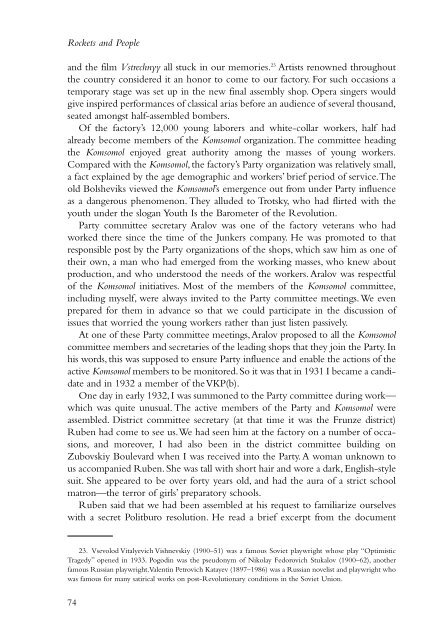to open next chapter. - NASA's History Office
to open next chapter. - NASA's History Office
to open next chapter. - NASA's History Office
You also want an ePaper? Increase the reach of your titles
YUMPU automatically turns print PDFs into web optimized ePapers that Google loves.
Rockets and People<br />
and the film Vstrechnyy all stuck in our memories. 23 Artists renowned throughout<br />
the country considered it an honor <strong>to</strong> come <strong>to</strong> our fac<strong>to</strong>ry. For such occasions a<br />
temporary stage was set up in the new final assembly shop. Opera singers would<br />
give inspired performances of classical arias before an audience of several thousand,<br />
seated amongst half-assembled bombers.<br />
Of the fac<strong>to</strong>ry’s 12,000 young laborers and white-collar workers, half had<br />
already become members of the Komsomol organization.The committee heading<br />
the Komsomol enjoyed great authority among the masses of young workers.<br />
Compared with the Komsomol,the fac<strong>to</strong>ry’s Party organization was relatively small,<br />
a fact explained by the age demographic and workers’ brief period of service.The<br />
old Bolsheviks viewed the Komsomol’s emergence out from under Party influence<br />
as a dangerous phenomenon. They alluded <strong>to</strong> Trotsky, who had flirted with the<br />
youth under the slogan Youth Is the Barometer of the Revolution.<br />
Party committee secretary Aralov was one of the fac<strong>to</strong>ry veterans who had<br />
worked there since the time of the Junkers company. He was promoted <strong>to</strong> that<br />
responsible post by the Party organizations of the shops, which saw him as one of<br />
their own, a man who had emerged from the working masses, who knew about<br />
production, and who unders<strong>to</strong>od the needs of the workers. Aralov was respectful<br />
of the Komsomol initiatives. Most of the members of the Komsomol committee,<br />
including myself, were always invited <strong>to</strong> the Party committee meetings.We even<br />
prepared for them in advance so that we could participate in the discussion of<br />
issues that worried the young workers rather than just listen passively.<br />
At one of these Party committee meetings,Aralov proposed <strong>to</strong> all the Komsomol<br />
committee members and secretaries of the leading shops that they join the Party. In<br />
his words, this was supposed <strong>to</strong> ensure Party influence and enable the actions of the<br />
active Komsomol members <strong>to</strong> be moni<strong>to</strong>red.So it was that in 1931 I became a candidate<br />
and in 1932 a member of the VKP(b).<br />
One day in early 1932, I was summoned <strong>to</strong> the Party committee during work—<br />
which was quite unusual. The active members of the Party and Komsomol were<br />
assembled. District committee secretary (at that time it was the Frunze district)<br />
Ruben had come <strong>to</strong> see us.We had seen him at the fac<strong>to</strong>ry on a number of occasions,<br />
and moreover, I had also been in the district committee building on<br />
Zubovskiy Boulevard when I was received in<strong>to</strong> the Party. A woman unknown <strong>to</strong><br />
us accompanied Ruben. She was tall with short hair and wore a dark, English-style<br />
suit. She appeared <strong>to</strong> be over forty years old, and had the aura of a strict school<br />
matron—the terror of girls’ prepara<strong>to</strong>ry schools.<br />
Ruben said that we had been assembled at his request <strong>to</strong> familiarize ourselves<br />
with a secret Politburo resolution. He read a brief excerpt from the document<br />
23. Vsevolod Vitalyevich Vishnevskiy (1900–51) was a famous Soviet playwright whose play “Optimistic<br />
Tragedy” <strong>open</strong>ed in 1933. Pogodin was the pseudonym of Nikolay Fedorovich Stukalov (1900–62), another<br />
famous Russian playwright.Valentin Petrovich Katayev (1897–1986) was a Russian novelist and playwright who<br />
was famous for many satirical works on post-Revolutionary conditions in the Soviet Union.<br />
74
















